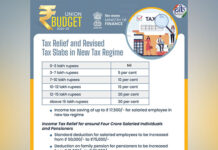NEW DELHI: Health insurance plans are tools for managing medical costs. It offers you coverage for unforeseen hospital bills as well as healthcare costs when you need it the most. Moreover, if you are thinking of getting some tax benefits, it is also available with health insurance plans, under Section 80D of the Income Tax Act of 1961.
If you want to know how to maximise your tax benefits through health check-ups and health insurance premiums, check this article out.
What is Section 80D of the Income Tax Act?
In a financial year, according to Section 80D of the Income Tax Act 1961, an individual or HUF (Hindu Undivided Family) can avail tax deductions of up to Rs. 25,000 on their health insurance premium paid. For senior citizens of 60 years of age and above, that tax deduction limit increases to Rs. 50,000 per fiscal year.
Who is Eligible for Deduction Under Section 80D?
Only individuals and HUFs are eligible to avail these tax benefits if they obtain health insurance plans for their parents, dependent children, spouse, or themselves and medical expenses incurred for senior citizens. No other entity like a firm or a company can claim a deduction under Section 80D.
Please note that the deductions are only applicable if you choose to pay your taxes under the old tax regime.
What Types of Health Insurance Plans are Allowed Under Section 80D?
The following are some of the health insurance plans that are available for tax deductions under Section 80D of the Income Tax Act.
1. Individual Health Insurance
This type of plan usually covers the policyholder himself, that is, only an individual is eligible for the policy.
2. Family Floater Health Insurance
Under a single policy, an entire family is covered by a family floater plan. In case of medical emergencies, any single family member can use the sum assured.
3. Senior Citizen Health Insurance
Senior citizen health insurance plans are only for individuals who are 60 years of age or above. Under Section 80D, there is a provision for higher deductions for premiums paid for senior citizen health insurance policies.
4. Critical Illness Insurance
This is a health insurance plan for specific life-threatening diseases, such as heart disease or cancer.
5. Preventive Health Check-Up Plans
Some health policies include coverage for preventive check-up plans. One can also purchase separate preventive health check-up plans. Under Section 80D, the premium one pays for these check-ups is eligible for an additional deduction.
What Deduction is Available Under Section 80D?
In a financial year, under Section 80D, an individual is allowed Rs. 25,000 of deduction. However, for a senior citizen, the limit is Rs 50,000.
Go through this table to understand the health insurance tax benefit available in various scenarios:
What Payments are Eligible as Deductions Under Section 80D?
Take a look at the pointers below to get an idea of what payments incur tax deductions:
Health Insurance Premiums Paid (Cash Payment Not Eligible)
* Up to Rs. 25,000 if you pay for yourself, dependent children, spouse, or parents
* Up to Rs. 50,000 if your parents or family are senior citizens (60 years and above)
Medical Expenses
– Residents of 60 years of age who do not benefit from any health insurance plans can claim up to Rs. 50,000 of deduction on incurred medical expenses
Preventive Health Check-Ups (Cash Payment Allowed)
* Up to Rs. 5,000 for self, parents, spouse, or dependent children
Contribution to CGHS/Notified Scheme
– If individuals contribute to notified schemes like the Central Government Health Scheme (CGHS) they can claim up to Rs. 25,000 in tax deduction. However, it is not eligible for this deduction if they make any such contribution on behalf of their parents.
The Bottom Line
Section 80D of the Income Tax Act offers substantial tax benefits for individuals and HUFs investing in health insurance plans. These benefits cover premiums for various health policies, including those for critical illnesses, preventive health check-ups, and medical expenses for senior citizens. Understanding this section can help taxpayers maximise their tax savings while ensuring adequate healthcare coverage. Nonetheless, if you are confused you can easily consult a tax advisor or talk with your insurance provider who can help you make the most of these benefits.
Also Read: Finance Act changes resident’s definition for income tax purposes







